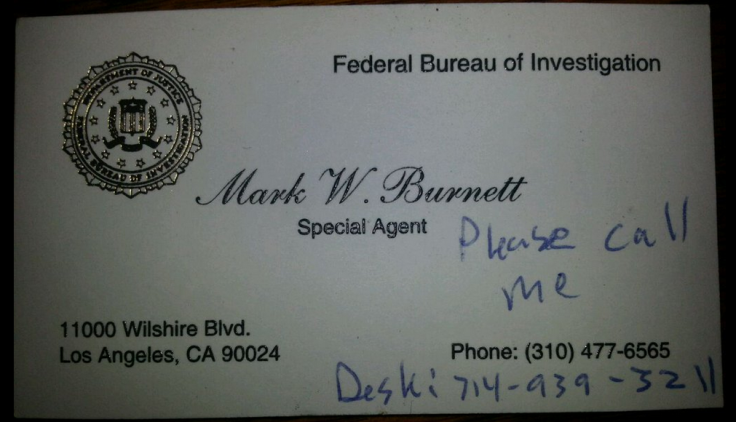Tor developer Isis Agora Lovecruft publicly accuses the FBI of harassment

It reportedly started with a house visit from the FBI and escalated to the threat of a federal subpoena. For one member of the Tor Project's core development team, named Isis Agora Lovecruft, the past six months have been characterised by stress, confusion and underhand threats at the hands of US law enforcement. Now, she has publicly accused the agency of harassment.
According to Lovecruft, a self-described 'anarchist, hacker and physicist', the ordeal started in November last year when an FBI agent called Mark Burnett paid a visit to her family home. Finding no-one home, the G-man reportedly left a card with an additional phone number penned in. A note read: "Please call me."
What followed, based on an in-depth testimony published online by Lovecruft, was a period of uncertainty – as the hacker balanced a move to Germany with meeting the demands of an increasingly invasive FBI – who would give no reason as to why exactly the meeting was even needed.
Lovecruft, who quickly involved a lawyer, wrote in the post on her website: "Burnett said the FBI simply wanted to ask me some questions." When speaking directly to the hired legal counsel, the FBI agent reportedly said: "If we happen to run into her on the street, we're gonna' be asking her some questions without you present."
Furthermore, referencing a potential meeting, the agent said: "We would strongly prefer to meet her in person. We have teams in Los Angeles, San Francisco, Chicago, New York, and Atlanta keeping an eye out for her."
The demands
According to Lovecruft, discussions then started about what the FBI was investigating. Naturally, the conversation turned to Tor network – used by privacy-conscious users to help stay anonymous while surfing the web and partly funded by the US government.
"My lawyer and I discussed what the FBI could possibly want," Lovecruft wrote. "Theories ranged from attempted entrapment, to the recent and completely unethical Carnegie Mellon University (CMU) attacks on the live Tor network, to a Grand Jury subpoena for someone else, to some shady request for a backdoor in some software I contribute to."
Indeed, Lovecruft is a well-known figure in GitHub circles and has over 350 followers on the popular open-source programming website. She continued: "We honestly could not come up with any coherent rationale for why the FBI would suddenly decide to come after me, as, to my knowledge, I have done nothing which should warrant any interest besides my contributions to open source encryption tools."
As previously reported by IBTimes UK, the FBI has worked alongside Carnegie Mellon to fund cutting-edge research into how the protections offered by the Tor network could be weakened. Still, despite ongoing conversations between lawyers and the FBI, Lovecruft said the agency has refused to elaborate as to why she was wanted for questioning.
I wonder if the FBI is going to start making A Thing of harassing developers of encryption software that they don't like.
— i∮ͥₛ f(t)dt (@isislovecruft) May 4, 2016
The voicemails
According to the testimony, roughly two months later Lovecruft's lawyer received a voicemail from a separate Atlanta-based FBI agent called Kelvin Porter saying the 'problem' had been fixed and that a face-to-face was no longer urgent. However, in a fresh update to the blog post on 4 May, the Tor developer claimed the FBI has been back in contact with her counsel.
"Are you the point of contact for serving a subpoena?" the agent reportedly said, adding that a meeting with Lovecruft is now needed to clear up her "potential involvement in a matter".
In the blog post, Lovecruft wrote: "Is this really how the United States has decided to treat American tech workers? Am I just the forerunner in a larger campaign by the FBI to personally go after developers of encryption software which annoys them?"
In a post on Twitter dated 4 May, the Tor Project said: "We support our colleague Isis." However, the organisation did not respond to a request for additional comment. As noted on the Tor Project's website, this is not the first time a member has been 'harassed' by the FBI.
We support our colleague Isis. Please read her blog post. #solidarity https://t.co/veSkuC5FXy
— torproject (@torproject) May 4, 2016
In response to the accusations, an FBI spokesperson told IBTimes UK: "The FBI, as a general policy, does not confirm nor deny investigations, nor comment on investigative activity unless it's a matter of public record (charges associated with an arrest, for example). If someone is alleging harassment of any kind that should be brought to the attention of the government, though it's unclear what specific activity is even being characterised as harassment."
© Copyright IBTimes 2025. All rights reserved.






















